Construction Accountant Resume Examples

Jul 18, 2024
|
12 min read
Master your construction accountant resume: lay the foundation for success and build a career that measures up.
Rated by 348 people
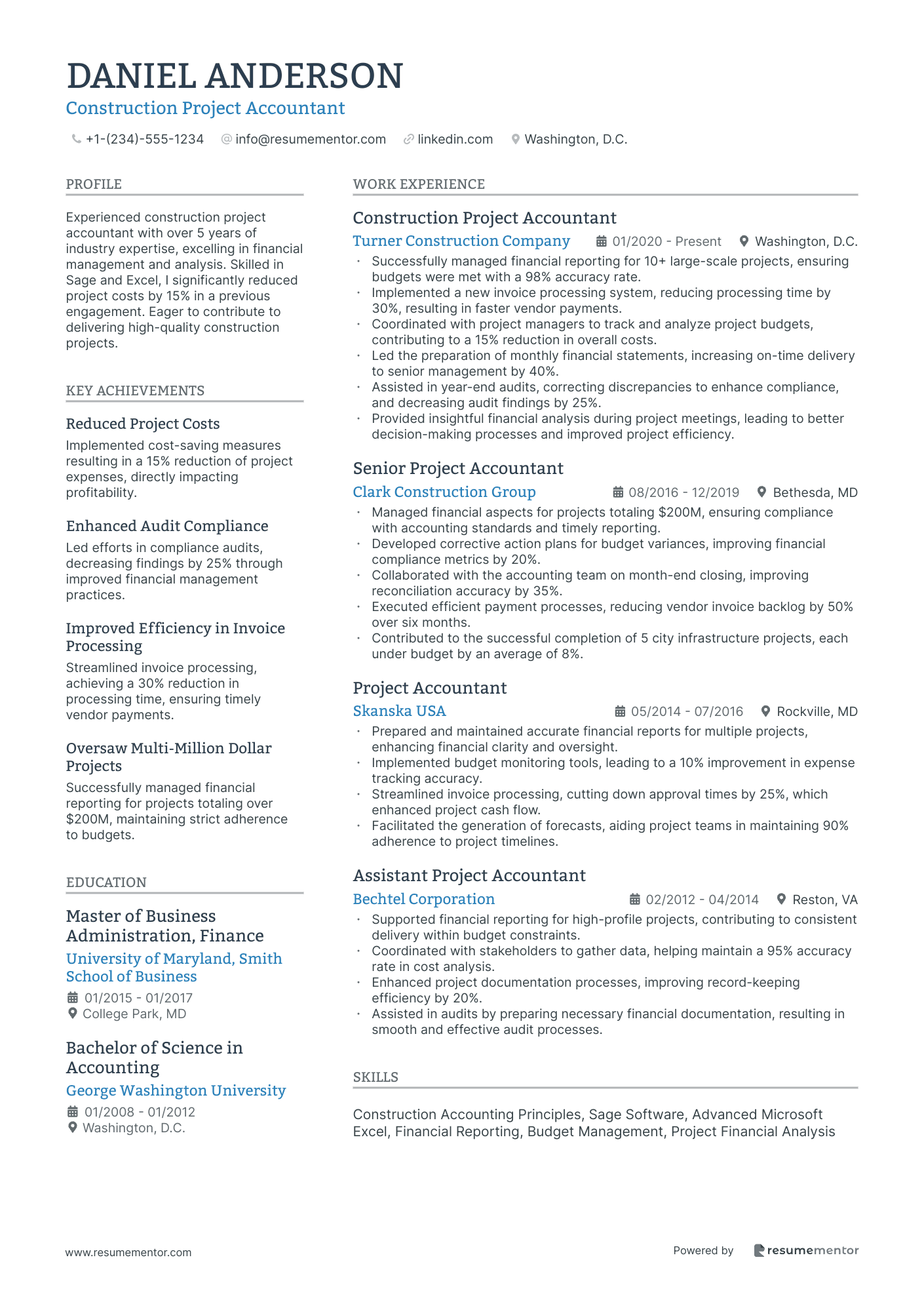
Construction Project Accountant
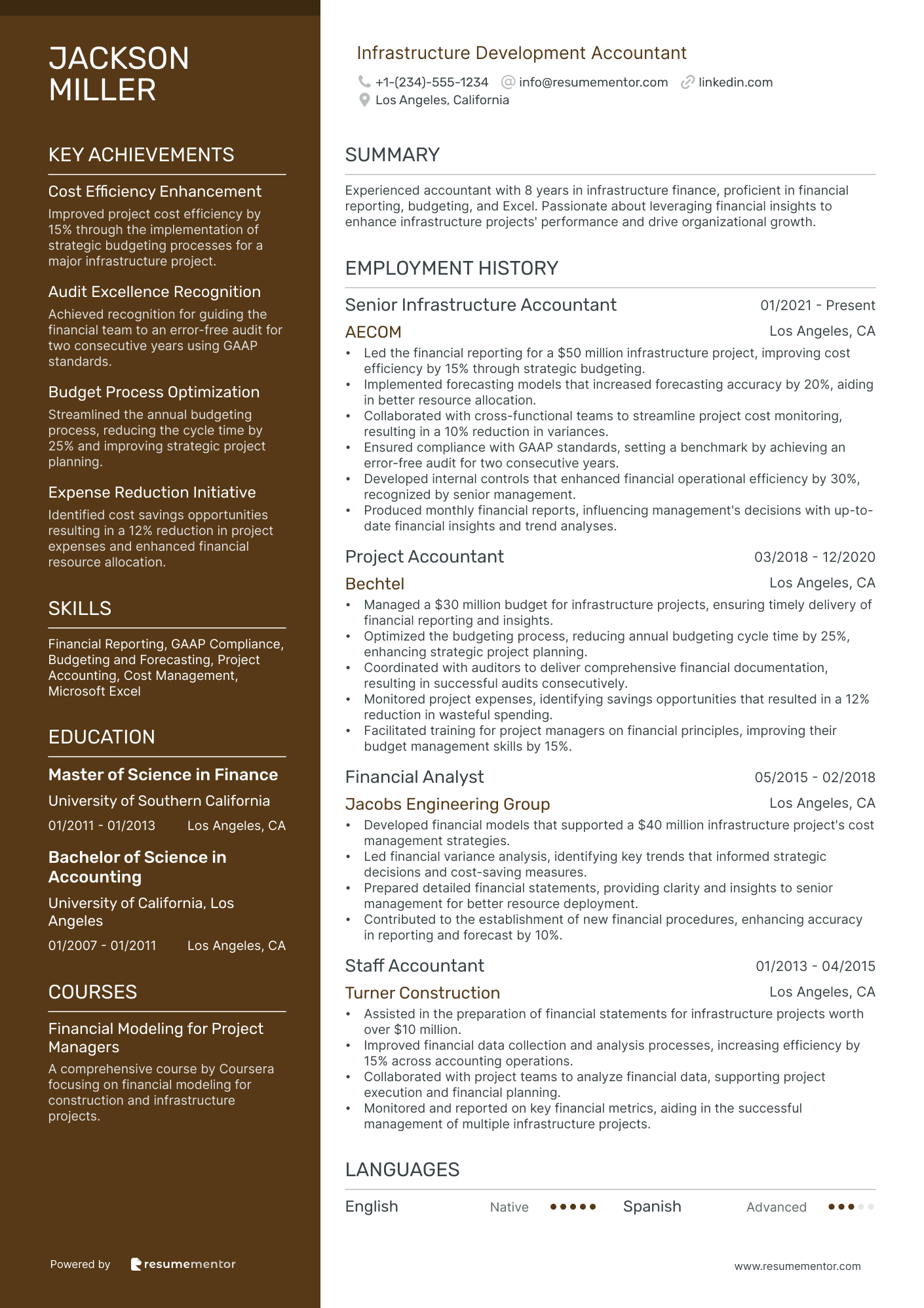
Infrastructure Development Accountant
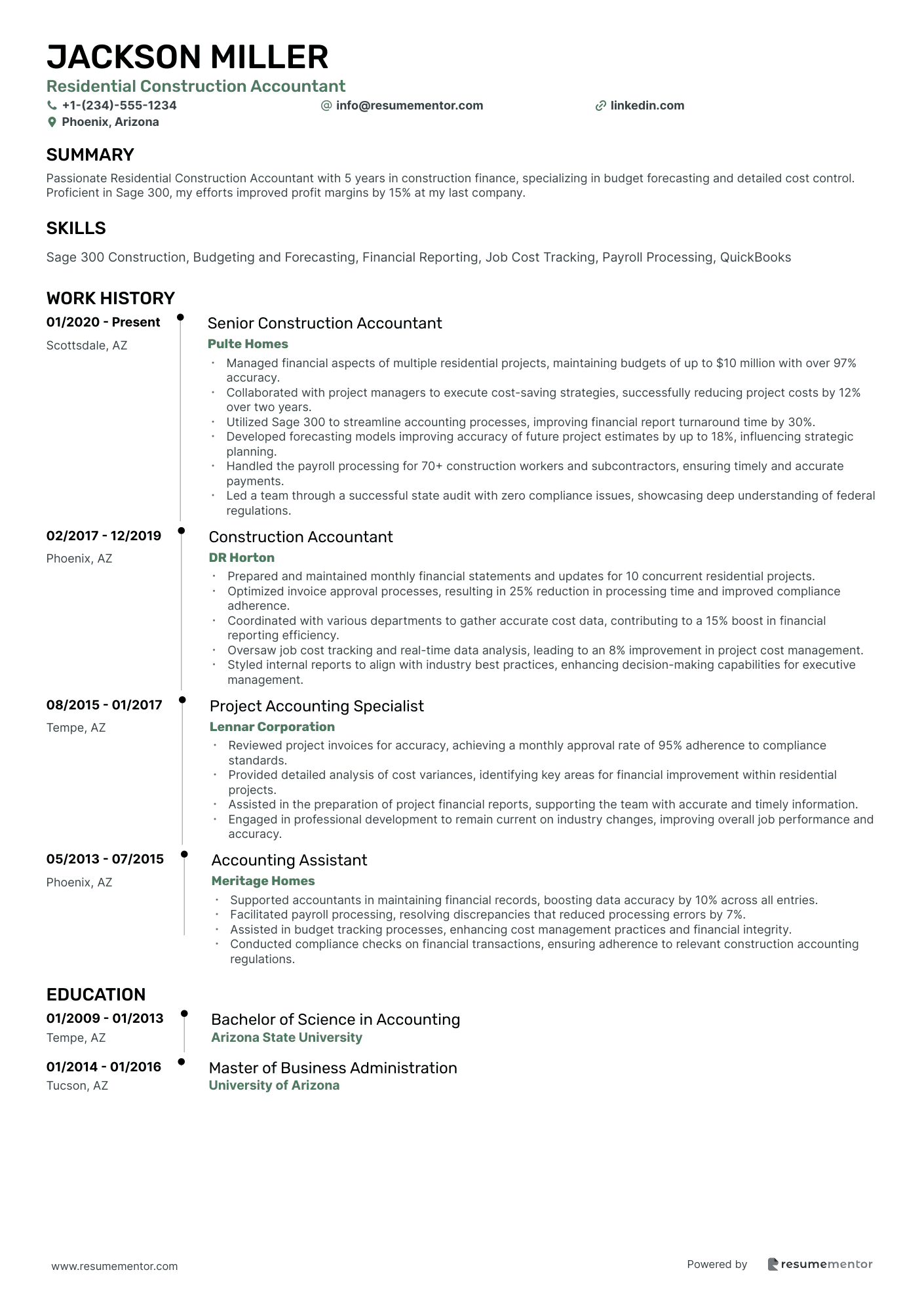
Residential Construction Accountant
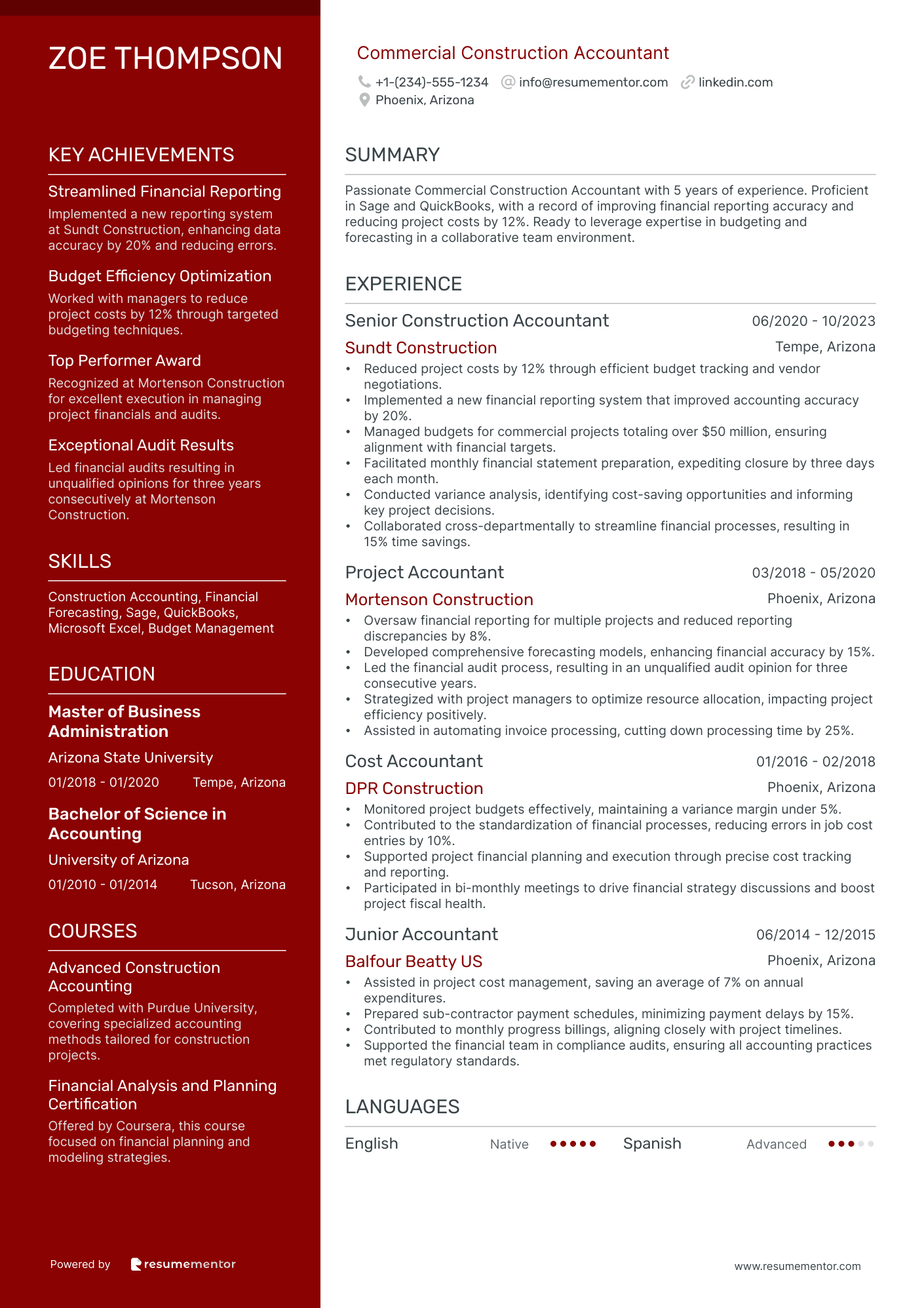
Commercial Construction Accountant
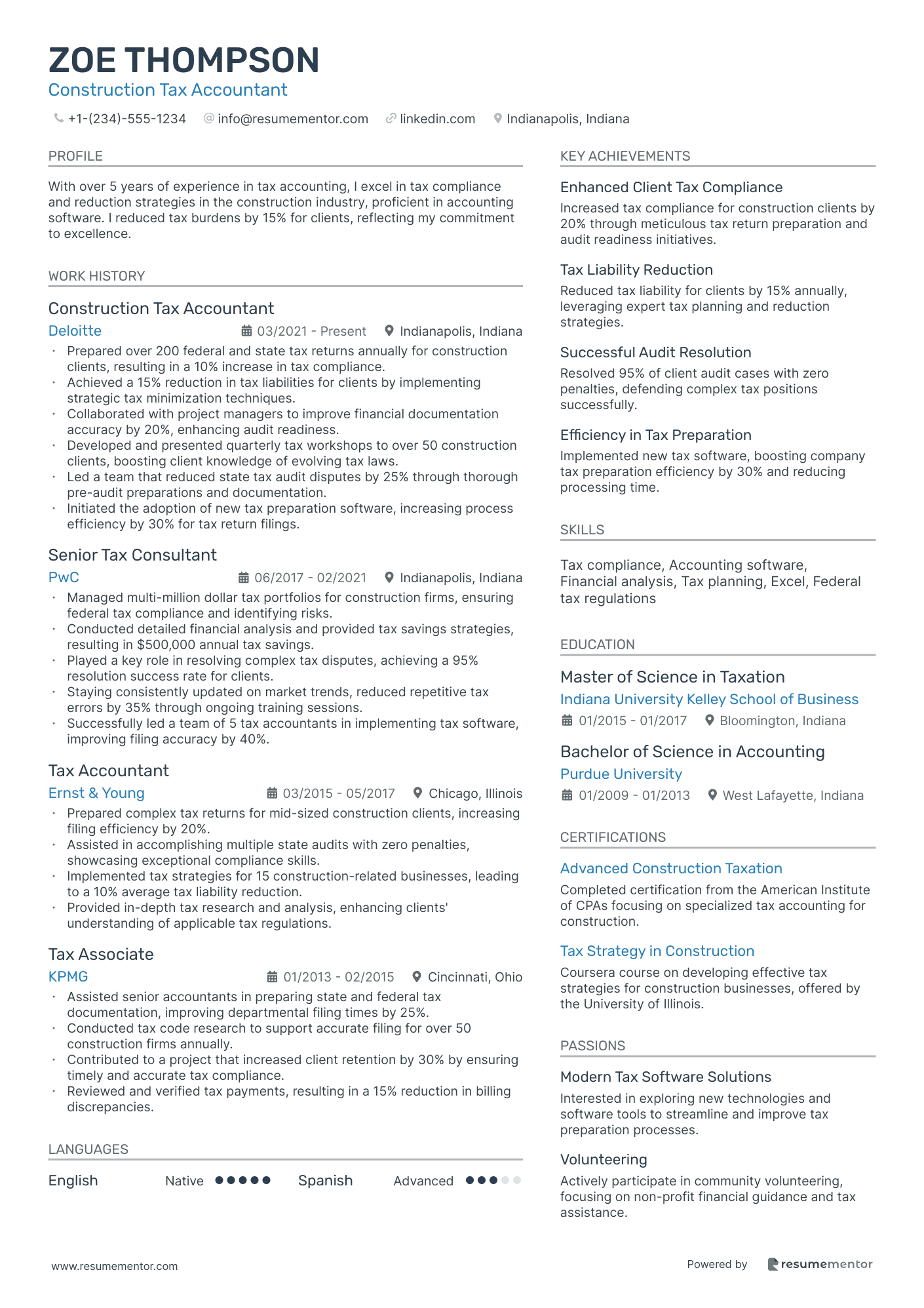
Construction Tax Accountant
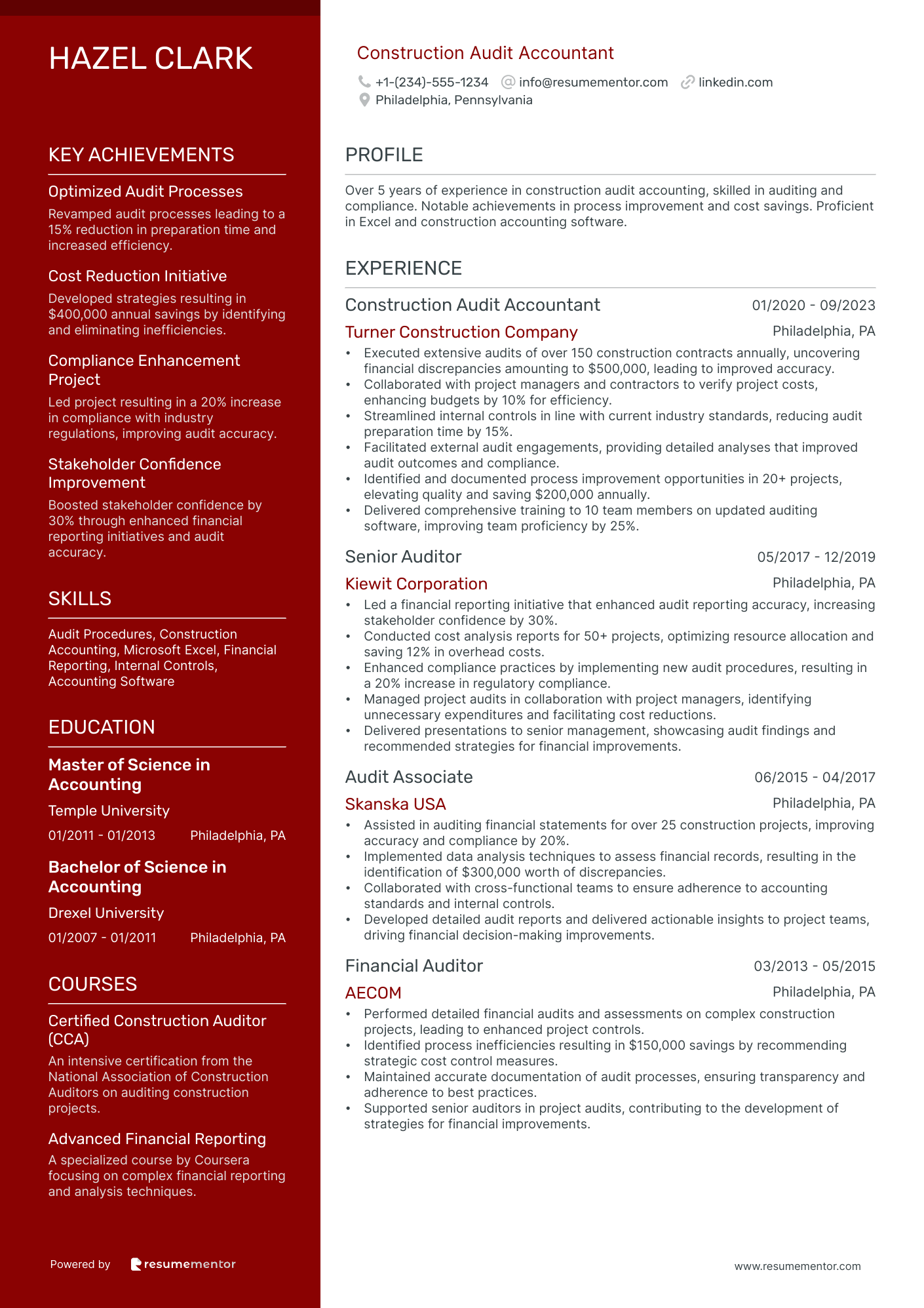
Construction Audit Accountant
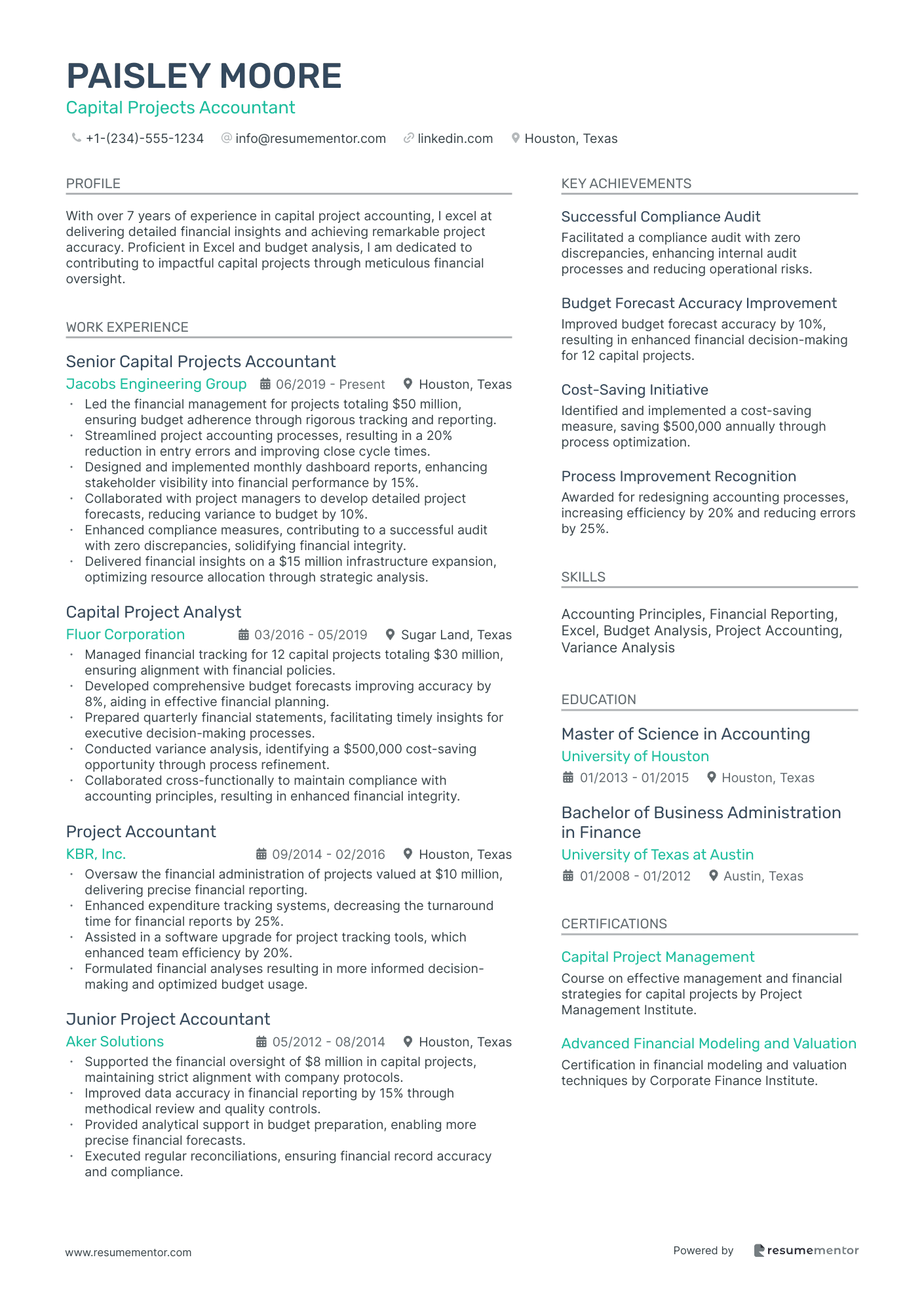
Capital Projects Accountant
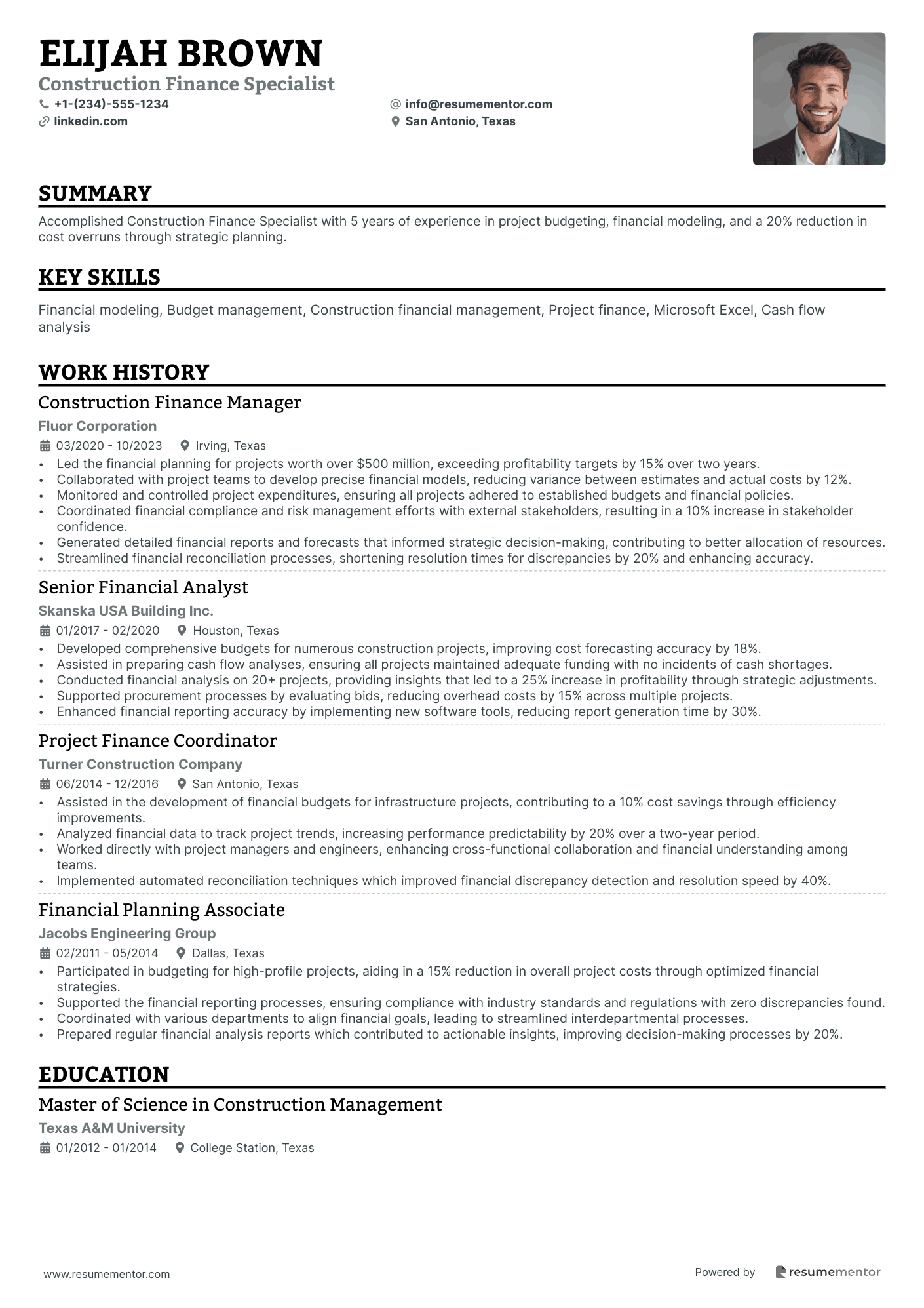
Construction Finance Specialist
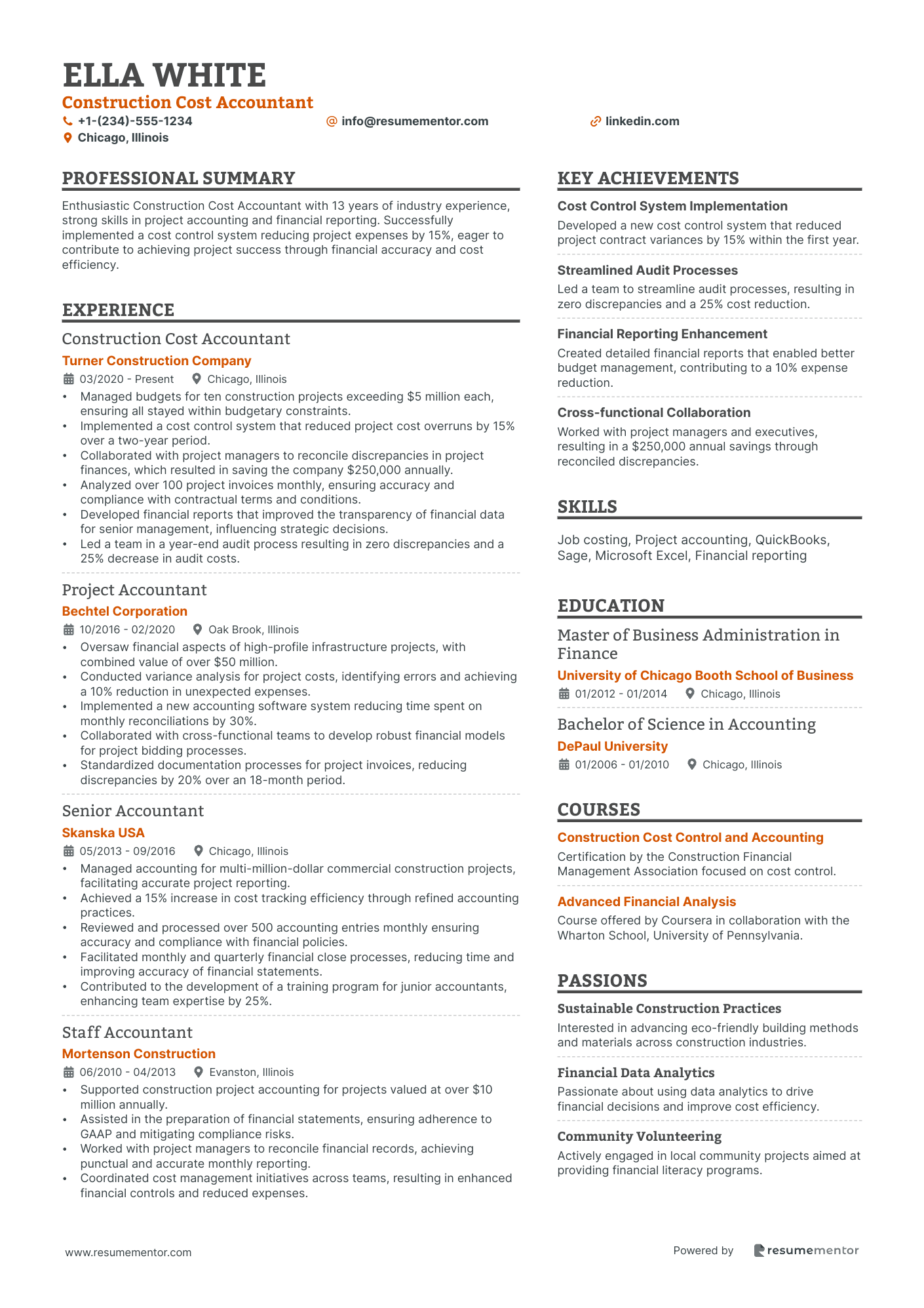
Construction Cost Accountant
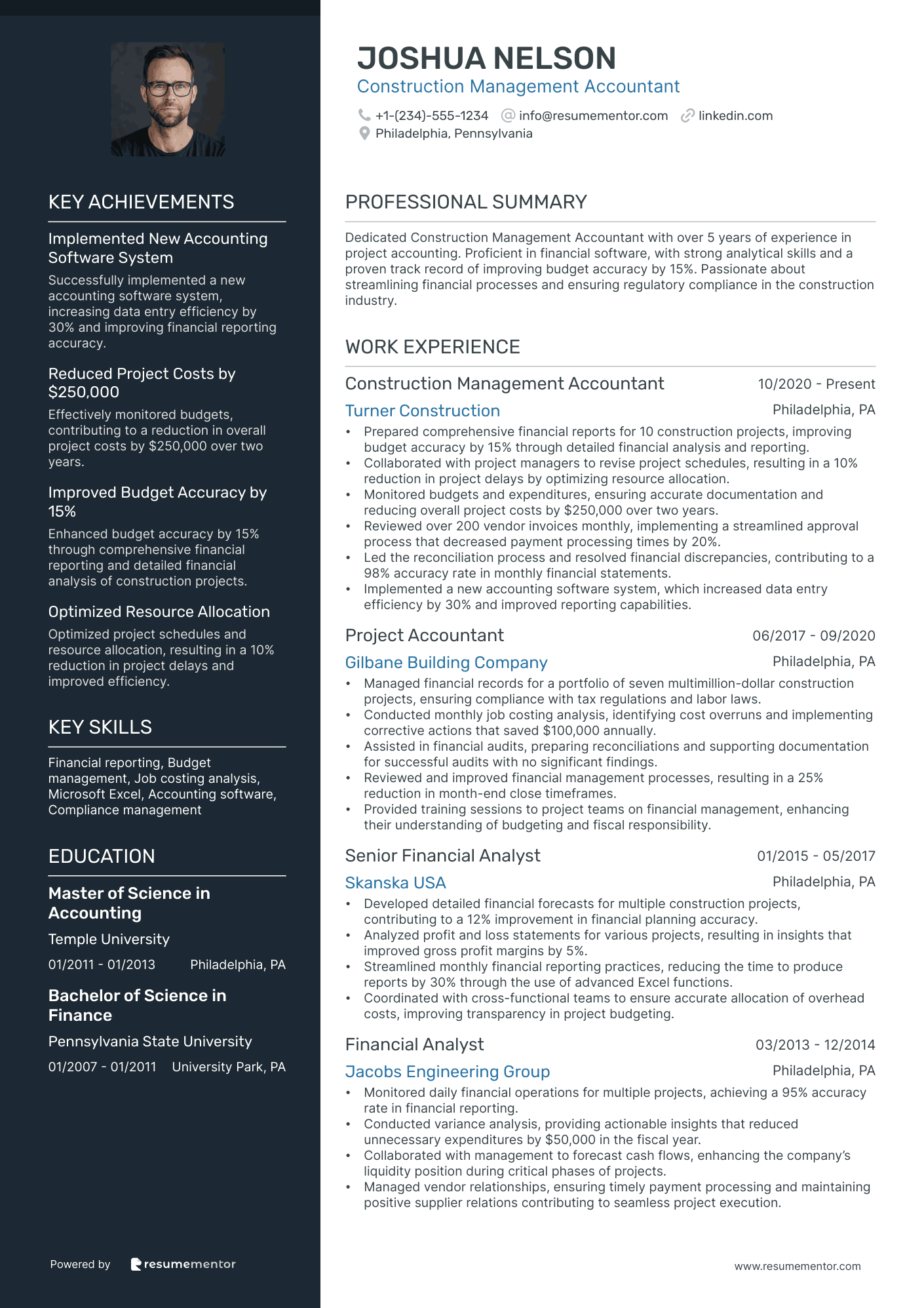
Construction Management Accountant

Construction Project Accountant resume sample
- •Successfully managed financial reporting for 10+ large-scale projects, ensuring budgets were met with a 98% accuracy rate.
- •Implemented a new invoice processing system, reducing processing time by 30%, resulting in faster vendor payments.
- •Coordinated with project managers to track and analyze project budgets, contributing to a 15% reduction in overall costs.
- •Led the preparation of monthly financial statements, increasing on-time delivery to senior management by 40%.
- •Assisted in year-end audits, correcting discrepancies to enhance compliance, and decreasing audit findings by 25%.
- •Provided insightful financial analysis during project meetings, leading to better decision-making processes and improved project efficiency.
- •Managed financial aspects for projects totaling $200M, ensuring compliance with accounting standards and timely reporting.
- •Developed corrective action plans for budget variances, improving financial compliance metrics by 20%.
- •Collaborated with the accounting team on month-end closing, improving reconciliation accuracy by 35%.
- •Executed efficient payment processes, reducing vendor invoice backlog by 50% over six months.
- •Contributed to the successful completion of 5 city infrastructure projects, each under budget by an average of 8%.
- •Prepared and maintained accurate financial reports for multiple projects, enhancing financial clarity and oversight.
- •Implemented budget monitoring tools, leading to a 10% improvement in expense tracking accuracy.
- •Streamlined invoice processing, cutting down approval times by 25%, which enhanced project cash flow.
- •Facilitated the generation of forecasts, aiding project teams in maintaining 90% adherence to project timelines.
- •Supported financial reporting for high-profile projects, contributing to consistent delivery within budget constraints.
- •Coordinated with stakeholders to gather data, helping maintain a 95% accuracy rate in cost analysis.
- •Enhanced project documentation processes, improving record-keeping efficiency by 20%.
- •Assisted in audits by preparing necessary financial documentation, resulting in smooth and effective audit processes.
Infrastructure Development Accountant resume sample
- •Led the financial reporting for a $50 million infrastructure project, improving cost efficiency by 15% through strategic budgeting.
- •Implemented forecasting models that increased forecasting accuracy by 20%, aiding in better resource allocation.
- •Collaborated with cross-functional teams to streamline project cost monitoring, resulting in a 10% reduction in variances.
- •Ensured compliance with GAAP standards, setting a benchmark by achieving an error-free audit for two consecutive years.
- •Developed internal controls that enhanced financial operational efficiency by 30%, recognized by senior management.
- •Produced monthly financial reports, influencing management's decisions with up-to-date financial insights and trend analyses.
- •Managed a $30 million budget for infrastructure projects, ensuring timely delivery of financial reporting and insights.
- •Optimized the budgeting process, reducing annual budgeting cycle time by 25%, enhancing strategic project planning.
- •Coordinated with auditors to deliver comprehensive financial documentation, resulting in successful audits consecutively.
- •Monitored project expenses, identifying savings opportunities that resulted in a 12% reduction in wasteful spending.
- •Facilitated training for project managers on financial principles, improving their budget management skills by 15%.
- •Developed financial models that supported a $40 million infrastructure project's cost management strategies.
- •Led financial variance analysis, identifying key trends that informed strategic decisions and cost-saving measures.
- •Prepared detailed financial statements, providing clarity and insights to senior management for better resource deployment.
- •Contributed to the establishment of new financial procedures, enhancing accuracy in reporting and forecast by 10%.
- •Assisted in the preparation of financial statements for infrastructure projects worth over $10 million.
- •Improved financial data collection and analysis processes, increasing efficiency by 15% across accounting operations.
- •Collaborated with project teams to analyze financial data, supporting project execution and financial planning.
- •Monitored and reported on key financial metrics, aiding in the successful management of multiple infrastructure projects.
Residential Construction Accountant resume sample
- •Managed financial aspects of multiple residential projects, maintaining budgets of up to $10 million with over 97% accuracy.
- •Collaborated with project managers to execute cost-saving strategies, successfully reducing project costs by 12% over two years.
- •Utilized Sage 300 to streamline accounting processes, improving financial report turnaround time by 30%.
- •Developed forecasting models improving accuracy of future project estimates by up to 18%, influencing strategic planning.
- •Handled the payroll processing for 70+ construction workers and subcontractors, ensuring timely and accurate payments.
- •Led a team through a successful state audit with zero compliance issues, showcasing deep understanding of federal regulations.
- •Prepared and maintained monthly financial statements and updates for 10 concurrent residential projects.
- •Optimized invoice approval processes, resulting in 25% reduction in processing time and improved compliance adherence.
- •Coordinated with various departments to gather accurate cost data, contributing to a 15% boost in financial reporting efficiency.
- •Oversaw job cost tracking and real-time data analysis, leading to an 8% improvement in project cost management.
- •Styled internal reports to align with industry best practices, enhancing decision-making capabilities for executive management.
- •Reviewed project invoices for accuracy, achieving a monthly approval rate of 95% adherence to compliance standards.
- •Provided detailed analysis of cost variances, identifying key areas for financial improvement within residential projects.
- •Assisted in the preparation of project financial reports, supporting the team with accurate and timely information.
- •Engaged in professional development to remain current on industry changes, improving overall job performance and accuracy.
- •Supported accountants in maintaining financial records, boosting data accuracy by 10% across all entries.
- •Facilitated payroll processing, resolving discrepancies that reduced processing errors by 7%.
- •Assisted in budget tracking processes, enhancing cost management practices and financial integrity.
- •Conducted compliance checks on financial transactions, ensuring adherence to relevant construction accounting regulations.
Commercial Construction Accountant resume sample
- •Reduced project costs by 12% through efficient budget tracking and vendor negotiations.
- •Implemented a new financial reporting system that improved accounting accuracy by 20%.
- •Managed budgets for commercial projects totaling over $50 million, ensuring alignment with financial targets.
- •Facilitated monthly financial statement preparation, expediting closure by three days each month.
- •Conducted variance analysis, identifying cost-saving opportunities and informing key project decisions.
- •Collaborated cross-departmentally to streamline financial processes, resulting in 15% time savings.
- •Oversaw financial reporting for multiple projects and reduced reporting discrepancies by 8%.
- •Developed comprehensive forecasting models, enhancing financial accuracy by 15%.
- •Led the financial audit process, resulting in an unqualified audit opinion for three consecutive years.
- •Strategized with project managers to optimize resource allocation, impacting project efficiency positively.
- •Assisted in automating invoice processing, cutting down processing time by 25%.
- •Monitored project budgets effectively, maintaining a variance margin under 5%.
- •Contributed to the standardization of financial processes, reducing errors in job cost entries by 10%.
- •Supported project financial planning and execution through precise cost tracking and reporting.
- •Participated in bi-monthly meetings to drive financial strategy discussions and boost project fiscal health.
- •Assisted in project cost management, saving an average of 7% on annual expenditures.
- •Prepared sub-contractor payment schedules, minimizing payment delays by 15%.
- •Contributed to monthly progress billings, aligning closely with project timelines.
- •Supported the financial team in compliance audits, ensuring all accounting practices met regulatory standards.
Construction Tax Accountant resume sample
- •Prepared over 200 federal and state tax returns annually for construction clients, resulting in a 10% increase in tax compliance.
- •Achieved a 15% reduction in tax liabilities for clients by implementing strategic tax minimization techniques.
- •Collaborated with project managers to improve financial documentation accuracy by 20%, enhancing audit readiness.
- •Developed and presented quarterly tax workshops to over 50 construction clients, boosting client knowledge of evolving tax laws.
- •Led a team that reduced state tax audit disputes by 25% through thorough pre-audit preparations and documentation.
- •Initiated the adoption of new tax preparation software, increasing process efficiency by 30% for tax return filings.
- •Managed multi-million dollar tax portfolios for construction firms, ensuring federal tax compliance and identifying risks.
- •Conducted detailed financial analysis and provided tax savings strategies, resulting in $500,000 annual tax savings.
- •Played a key role in resolving complex tax disputes, achieving a 95% resolution success rate for clients.
- •Staying consistently updated on market trends, reduced repetitive tax errors by 35% through ongoing training sessions.
- •Successfully led a team of 5 tax accountants in implementing tax software, improving filing accuracy by 40%.
- •Prepared complex tax returns for mid-sized construction clients, increasing filing efficiency by 20%.
- •Assisted in accomplishing multiple state audits with zero penalties, showcasing exceptional compliance skills.
- •Implemented tax strategies for 15 construction-related businesses, leading to a 10% average tax liability reduction.
- •Provided in-depth tax research and analysis, enhancing clients' understanding of applicable tax regulations.
- •Assisted senior accountants in preparing state and federal tax documentation, improving departmental filing times by 25%.
- •Conducted tax code research to support accurate filing for over 50 construction firms annually.
- •Contributed to a project that increased client retention by 30% by ensuring timely and accurate tax compliance.
- •Reviewed and verified tax payments, resulting in a 15% reduction in billing discrepancies.
Construction Audit Accountant resume sample
- •Executed extensive audits of over 150 construction contracts annually, uncovering financial discrepancies amounting to $500,000, leading to improved accuracy.
- •Collaborated with project managers and contractors to verify project costs, enhancing budgets by 10% for efficiency.
- •Streamlined internal controls in line with current industry standards, reducing audit preparation time by 15%.
- •Facilitated external audit engagements, providing detailed analyses that improved audit outcomes and compliance.
- •Identified and documented process improvement opportunities in 20+ projects, elevating quality and saving $200,000 annually.
- •Delivered comprehensive training to 10 team members on updated auditing software, improving team proficiency by 25%.
- •Led a financial reporting initiative that enhanced audit reporting accuracy, increasing stakeholder confidence by 30%.
- •Conducted cost analysis reports for 50+ projects, optimizing resource allocation and saving 12% in overhead costs.
- •Enhanced compliance practices by implementing new audit procedures, resulting in a 20% increase in regulatory compliance.
- •Managed project audits in collaboration with project managers, identifying unnecessary expenditures and facilitating cost reductions.
- •Delivered presentations to senior management, showcasing audit findings and recommended strategies for financial improvements.
- •Assisted in auditing financial statements for over 25 construction projects, improving accuracy and compliance by 20%.
- •Implemented data analysis techniques to assess financial records, resulting in the identification of $300,000 worth of discrepancies.
- •Collaborated with cross-functional teams to ensure adherence to accounting standards and internal controls.
- •Developed detailed audit reports and delivered actionable insights to project teams, driving financial decision-making improvements.
- •Performed detailed financial audits and assessments on complex construction projects, leading to enhanced project controls.
- •Identified process inefficiencies resulting in $150,000 savings by recommending strategic cost control measures.
- •Maintained accurate documentation of audit processes, ensuring transparency and adherence to best practices.
- •Supported senior auditors in project audits, contributing to the development of strategies for financial improvements.
Capital Projects Accountant resume sample
- •Led the financial management for projects totaling $50 million, ensuring budget adherence through rigorous tracking and reporting.
- •Streamlined project accounting processes, resulting in a 20% reduction in entry errors and improving close cycle times.
- •Designed and implemented monthly dashboard reports, enhancing stakeholder visibility into financial performance by 15%.
- •Collaborated with project managers to develop detailed project forecasts, reducing variance to budget by 10%.
- •Enhanced compliance measures, contributing to a successful audit with zero discrepancies, solidifying financial integrity.
- •Delivered financial insights on a $15 million infrastructure expansion, optimizing resource allocation through strategic analysis.
- •Managed financial tracking for 12 capital projects totaling $30 million, ensuring alignment with financial policies.
- •Developed comprehensive budget forecasts improving accuracy by 8%, aiding in effective financial planning.
- •Prepared quarterly financial statements, facilitating timely insights for executive decision-making processes.
- •Conducted variance analysis, identifying a $500,000 cost-saving opportunity through process refinement.
- •Collaborated cross-functionally to maintain compliance with accounting principles, resulting in enhanced financial integrity.
- •Oversaw the financial administration of projects valued at $10 million, delivering precise financial reporting.
- •Enhanced expenditure tracking systems, decreasing the turnaround time for financial reports by 25%.
- •Assisted in a software upgrade for project tracking tools, which enhanced team efficiency by 20%.
- •Formulated financial analyses resulting in more informed decision-making and optimized budget usage.
- •Supported the financial oversight of $8 million in capital projects, maintaining strict alignment with company protocols.
- •Improved data accuracy in financial reporting by 15% through methodical review and quality controls.
- •Provided analytical support in budget preparation, enabling more precise financial forecasts.
- •Executed regular reconciliations, ensuring financial record accuracy and compliance.
Construction Finance Specialist resume sample
- •Led the financial planning for projects worth over $500 million, exceeding profitability targets by 15% over two years.
- •Collaborated with project teams to develop precise financial models, reducing variance between estimates and actual costs by 12%.
- •Monitored and controlled project expenditures, ensuring all projects adhered to established budgets and financial policies.
- •Coordinated financial compliance and risk management efforts with external stakeholders, resulting in a 10% increase in stakeholder confidence.
- •Generated detailed financial reports and forecasts that informed strategic decision-making, contributing to better allocation of resources.
- •Streamlined financial reconciliation processes, shortening resolution times for discrepancies by 20% and enhancing accuracy.
- •Developed comprehensive budgets for numerous construction projects, improving cost forecasting accuracy by 18%.
- •Assisted in preparing cash flow analyses, ensuring all projects maintained adequate funding with no incidents of cash shortages.
- •Conducted financial analysis on 20+ projects, providing insights that led to a 25% increase in profitability through strategic adjustments.
- •Supported procurement processes by evaluating bids, reducing overhead costs by 15% across multiple projects.
- •Enhanced financial reporting accuracy by implementing new software tools, reducing report generation time by 30%.
- •Assisted in the development of financial budgets for infrastructure projects, contributing to a 10% cost savings through efficiency improvements.
- •Analyzed financial data to track project trends, increasing performance predictability by 20% over a two-year period.
- •Worked directly with project managers and engineers, enhancing cross-functional collaboration and financial understanding among teams.
- •Implemented automated reconciliation techniques which improved financial discrepancy detection and resolution speed by 40%.
- •Participated in budgeting for high-profile projects, aiding in a 15% reduction in overall project costs through optimized financial strategies.
- •Supported the financial reporting processes, ensuring compliance with industry standards and regulations with zero discrepancies found.
- •Coordinated with various departments to align financial goals, leading to streamlined interdepartmental processes.
- •Prepared regular financial analysis reports which contributed to actionable insights, improving decision-making processes by 20%.
Construction Cost Accountant resume sample
- •Managed budgets for ten construction projects exceeding $5 million each, ensuring all stayed within budgetary constraints.
- •Implemented a cost control system that reduced project cost overruns by 15% over a two-year period.
- •Collaborated with project managers to reconcile discrepancies in project finances, which resulted in saving the company $250,000 annually.
- •Analyzed over 100 project invoices monthly, ensuring accuracy and compliance with contractual terms and conditions.
- •Developed financial reports that improved the transparency of financial data for senior management, influencing strategic decisions.
- •Led a team in a year-end audit process resulting in zero discrepancies and a 25% decrease in audit costs.
- •Oversaw financial aspects of high-profile infrastructure projects, with combined value of over $50 million.
- •Conducted variance analysis for project costs, identifying errors and achieving a 10% reduction in unexpected expenses.
- •Implemented a new accounting software system reducing time spent on monthly reconciliations by 30%.
- •Collaborated with cross-functional teams to develop robust financial models for project bidding processes.
- •Standardized documentation processes for project invoices, reducing discrepancies by 20% over an 18-month period.
- •Managed accounting for multi-million-dollar commercial construction projects, facilitating accurate project reporting.
- •Achieved a 15% increase in cost tracking efficiency through refined accounting practices.
- •Reviewed and processed over 500 accounting entries monthly ensuring accuracy and compliance with financial policies.
- •Facilitated monthly and quarterly financial close processes, reducing time and improving accuracy of financial statements.
- •Contributed to the development of a training program for junior accountants, enhancing team expertise by 25%.
- •Supported construction project accounting for projects valued at over $10 million annually.
- •Assisted in the preparation of financial statements, ensuring adherence to GAAP and mitigating compliance risks.
- •Worked with project managers to reconcile financial records, achieving punctual and accurate monthly reporting.
- •Coordinated cost management initiatives across teams, resulting in enhanced financial controls and reduced expenses.
Construction Management Accountant resume sample
- •Prepared comprehensive financial reports for 10 construction projects, improving budget accuracy by 15% through detailed financial analysis and reporting.
- •Collaborated with project managers to revise project schedules, resulting in a 10% reduction in project delays by optimizing resource allocation.
- •Monitored budgets and expenditures, ensuring accurate documentation and reducing overall project costs by $250,000 over two years.
- •Reviewed over 200 vendor invoices monthly, implementing a streamlined approval process that decreased payment processing times by 20%.
- •Led the reconciliation process and resolved financial discrepancies, contributing to a 98% accuracy rate in monthly financial statements.
- •Implemented a new accounting software system, which increased data entry efficiency by 30% and improved reporting capabilities.
- •Managed financial records for a portfolio of seven multimillion-dollar construction projects, ensuring compliance with tax regulations and labor laws.
- •Conducted monthly job costing analysis, identifying cost overruns and implementing corrective actions that saved $100,000 annually.
- •Assisted in financial audits, preparing reconciliations and supporting documentation for successful audits with no significant findings.
- •Reviewed and improved financial management processes, resulting in a 25% reduction in month-end close timeframes.
- •Provided training sessions to project teams on financial management, enhancing their understanding of budgeting and fiscal responsibility.
- •Developed detailed financial forecasts for multiple construction projects, contributing to a 12% improvement in financial planning accuracy.
- •Analyzed profit and loss statements for various projects, resulting in insights that improved gross profit margins by 5%.
- •Streamlined monthly financial reporting practices, reducing the time to produce reports by 30% through the use of advanced Excel functions.
- •Coordinated with cross-functional teams to ensure accurate allocation of overhead costs, improving transparency in project budgeting.
- •Monitored daily financial operations for multiple projects, achieving a 95% accuracy rate in financial reporting.
- •Conducted variance analysis, providing actionable insights that reduced unnecessary expenditures by $50,000 in the fiscal year.
- •Collaborated with management to forecast cash flows, enhancing the company’s liquidity position during critical phases of projects.
- •Managed vendor relationships, ensuring timely payment processing and maintaining positive supplier relations contributing to seamless project execution.
Crafting a construction accountant resume can feel like building a house from scratch; each element must fit perfectly to create a strong structure. Your skills in finance and construction management need to be transformed into a concise and impactful narrative. It’s crucial to balance your expertise in areas like budgets, invoices, and project costs with your industry experience, particularly when navigating the job market.
Communicating your value clearly in such a competitive field can be challenging. Like many professionals, you might find it tough to stand out amidst a sea of resumes. Here's where a resume template can be your guiding blueprint. These templates allow you to focus on what truly matters—your unique skills and experiences—by simplifying the structure and giving your content a polished, professional appearance.
Selecting the right resume template is like laying down a foundation for your professional story. Each section of your resume should naturally highlight your strengths, ensuring clarity and ease of reading. This not only showcases your expertise but also significantly boosts your chances of securing that important interview. With this guide, you’ll be equipped to craft a resume that accurately reflects your capabilities in construction finance and stands out in the job market.
Key Takeaways
- A construction accountant resume requires a balanced narrative of finance and construction management to effectively highlight budgeting, invoicing, and project costing skills within industry experience.
- Selecting an appropriate resume template helps focus on unique skills and experiences, simplifying the structure while showcasing expertise and increasing interview chances.
- Each section of the resume should highlight strengths like construction budgeting, software proficiency, analytical skills, and certifications to present a well-rounded skill set.
- Using a reverse-chronological format emphasizes career growth, while the right font and saving as a PDF preserve professionalism and consistency across devices.
- Including quantifiable achievements with strong action verbs in the experience section demonstrates impact and aligns with job-specific demands, illustrating value to potential employers.
What to focus on when writing your construction accountant resume
Your construction accountant resume should confidently communicate your expertise in managing financials within the construction industry—emphasize your skills in construction budgeting, cost control, and financial reporting to show how you can contribute to a project's success. Elaborate on your experience with construction contracts and project costing, and highlight your proficiency with industry-specific software tools. Demonstrating your strong analytical skills and attention to detail further assures recruiters of your capability in this niche. Make sure the resume is structured in a way that captures your career highlights effectively. Below, we’ll cover each section more in-depth, offering insights into how to best format your resume for success.
How to structure your construction accountant resume
- Contact Information: Begin with your full name, phone number, email address, and LinkedIn profile link—ensure this section is clear and current, as it's the first thing recruiters see.
- Professional Summary: Offer a brief overview of your experience and skills in construction accounting. Mention your years of experience, any significant achievements, and specializations like compliance or project accounting that set you apart.
- Work Experience: List relevant job titles, company names, and employment dates. Detail your specific duties such as managing budgets, preparing financial statements, and handling payroll for construction projects to illustrate your hands-on experience.
- Education: Include your degrees, associated institutions, and graduation dates. Mention any special coursework focused on construction finance or accounting to underscore your formal training.
- Key Skills: Highlight specialized skills in construction accounting, including cost tracking, budget analysis, proficiency with software like Sage or QuickBooks, and a firm grasp of construction laws and regulations.
- Certifications: List relevant certifications like CPA (Certified Public Accountant) or CCIFP (Certified Construction Industry Financial Professional), which can further solidify your qualifications.
Optional sections could include awards, volunteer work, or professional memberships, further demonstrating your dedication and active participation in the construction accounting field.
Which resume format to choose
Crafting a resume as a construction accountant starts with selecting the right format, and a reverse-chronological style is ideal. This format showcases your most recent roles at the top, crucial for displaying the steady career growth that hiring managers in the construction industry look for. Your experience speaks volumes, and this layout ensures it gets noticed first.
Choosing the right font can make a significant impact on how your resume is perceived. Opt for fonts like Rubik, Lato, or Montserrat, which offer a clean, modern look while maintaining the professionalism necessary in accounting. These fonts ensure that your information is easy to read, which can make a positive impression on potential employers reviewing your resume.
Saving your resume as a PDF is crucial. PDFs preserve your formatting, ensuring your document looks the same on every device. This consistency is vital, as it reflects your attention to detail and professionalism—traits highly valued in accounting roles.
Setting your margins to about an inch on all sides is another important step. This not only keeps your resume looking neat and tidy but also provides plenty of white space, making your content more digestible at a glance. Every element, from format to file type, plays a part in presenting your skills and experience effectively, all of which are essential in crafting a standout construction accountant resume.
How to write a quantifiable resume experience section
Your experience section is the heart of your construction accountant resume, connecting your career milestones into a cohesive story. Start with your most recent job and work backward, maintaining a chronological order that showcases your growth. Focusing on the past 10 to 15 years allows you to highlight significant achievements, using job titles like "Construction Accountant," "Project Accountant," or "Senior Accountant" that resonate with industry standards. As you tailor your resume for each job ad, incorporate language and requirements from the listings to illustrate that you're a strong match for the role. Use powerful action verbs like "managed," "coordinated," "implemented," and "optimized" to underscore how you drove outcomes. Moreover, quantifying achievements with numbers, percentages, or timeframes turns each bullet point into a testament of your impact.
Here's an example of a strong construction accountant experience section:
- •Reduced project costs by 15% through strategic cost control measures.
- •Led the implementation of new accounting software, reducing reporting time by 30%.
- •Coordinated with project managers to reconcile financial discrepancies, achieving a 98% accuracy rate.
- •Improved cash flow forecasting accuracy by 20%, maximizing working capital efficiency.
This experience section effectively ties together your accomplishments, emphasizing specific, quantifiable achievements that employers prioritize in construction accounting. The use of robust action verbs is seamlessly integrated with measurable results, highlighting your proactive role and tangible impact within the company. By aligning the content with job-specific demands, your resume resonates well with hiring managers, providing a clear narrative of your strengths through precisely presented numbers. This creates a compelling, comprehensive picture of your skills and contributions.
Result-Focused resume experience section
A result-focused construction accountant resume experience section should highlight how you've successfully contributed to the financial well-being of your past employers. Begin by illustrating your key achievements, specifically showcasing improvements made in processes or cost savings implemented. Use powerful action verbs to clearly convey your role in each project, emphasizing outcomes that can be quantified, such as savings achieved or efficiencies improved. This approach clearly demonstrates how your skills and actions have previously driven success.
Next, present your experience through well-structured bullet points, making it easy for hiring managers to understand your key contributions at a glance. Each point should detail a specific task or project, include the methods or tools you employed, and focus on the positive results achieved. Tailor your descriptions to align with the job you’re applying for, incorporating relevant keywords from the listing to make your resume more appealing to recruiters. This method ensures that your resume effectively highlights the skills and accomplishments that hiring managers are looking for.
Senior Construction Accountant
ABC Constructions Inc.
2020-2023
- Managed financial reporting for construction projects, reducing preparation time by 30%.
- Led a team to implement new budgeting software that increased financial accuracy by 20%.
- Streamlined invoice processes, cutting payment cycles down from 45 to 30 days.
- Identified cost-saving opportunities, achieving annual savings of $100,000.
Growth-Focused resume experience section
A growth-focused construction accountant resume experience section should clearly demonstrate your ability to support a company's financial success. Reflect on your roles where you've effectively enhanced financial processes, which, in turn, supported business development. Concentrate on specific achievements, such as improving efficiency or reducing costs, to show how you contributed to boosting profitability. Make your accomplishments stand out by quantifying them, adding concrete numbers that enhance your credibility.
When crafting bullet points, keep them concise yet informative, starting each with strong action verbs to highlight your contributions and their impact. Each point should reveal different facets of your expertise, showcasing how your skills promote company growth. Use language that is easy to understand, focusing on general achievements like improving financial reports or managing budgets effectively, to create a section that resonates with any reader.
Senior Construction Accountant
ABC Construction Inc.
June 2018 - August 2023
- Led a team to streamline accounting processes, cutting report preparation time by 20%.
- Developed cost-saving strategies, reducing annual budget expenditure by 15%.
- Enhanced cash flow management, resulting in a 25% decrease in overdue receivables.
- Coordinated with project managers for accurate financial projections, boosting bidding success by 30%.
Efficiency-Focused resume experience section
A resume experience section focused on efficiency for a construction accountant should clearly demonstrate how your skills translate into streamlined financial processes. Highlight significant achievements where you've improved financial systems and reduced costs without sacrificing accuracy in your reports. This not only showcases the value you brought to past roles but also indicates your potential to contribute significantly to your future employer’s success. Ensure your examples include specific details and quantifiable data to effectively illustrate your accomplishments.
Start by listing your previous job titles, then provide clear, concise bullet points that outline your key responsibilities and achievements. It’s important to connect how your efforts in utilizing systems have led to task simplification or resource-saving strategies. This method allows potential employers to easily grasp the impact you've had on overall project efficiency. By tailoring your experiences to align with the job you’re applying for, you effectively highlight the accomplishments most relevant to the prospective position’s needs.
Construction Accountant
BuildStrong Corp
June 2020 - August 2023
- Improved the financial reporting system, reducing reporting time by 30%.
- Streamlined billing processes, cutting down on billing errors by 25%.
- Implemented a cost-tracking system that saved the company $50,000 annually.
- Led a team in digitizing expense records, enhancing data retrieval speed by 40%.
Training and Development Focused resume experience section
A Training and Development-focused construction accountant resume experience section should showcase your ability to enhance team skills and drive growth. Begin by reflecting on moments when you led training initiatives or mentored colleagues. Did you design effective training materials, spearhead workshops, or provide valuable mentorship? Consider projects where sharing your expertise led to significant improvements or the implementation of new accounting systems. These examples highlight your capacity to cultivate growth and development within your team, a vital skill for a training-focused role.
In your resume experience section, ensure your achievements are clear and concise. Use bullet points to list your accomplishments, particularly those that improved processes or furthered team development. Whenever feasible, add numbers to illustrate your impact, such as how many individuals you guided or gains in efficiency. This structured approach underscores your leadership in training and development, presenting you as an invaluable asset to employers seeking someone who can enhance their team's capabilities.
Construction Accountant
XYZ Construction Co.
June 2020 - March 2023
- Developed and delivered a financial software training program, reducing data entry errors by 30%.
- Led a series of workshops on compliance updates, improving team adherence to regulations by 20%.
- Implemented a peer-mentoring program, resulting in a 15% increase in team productivity.
- Created training manuals that streamlined onboarding for new hires, reducing onboarding time by 40%.
Write your construction accountant resume summary section
A results-focused construction accountant resume summary should effectively highlight your unique strengths and professional experiences. This section sets a positive tone for your resume and quickly showcases your career achievements. Instead of simply listing tasks, emphasize specific skills and the impact you've had in your roles. Use powerful language to demonstrate your proficiency in handling finances, budgets, and compliance in construction projects. Consider this example:
This summary immediately signals your level of expertise and showcases your specialized skills. By emphasizing your ability in budget forecasting and cost analysis, you highlight your relevance to potential employers. By including your analytical capabilities, you convey your depth of understanding beyond mere number-crunching. When describing yourself, focus on the skills most pertinent to the role, using action words to clarify your impact and provide a preview of your work ethic. It's important to differentiate between a resume summary and a resume objective. A summary works best when you have significant work experience, emphasizing your skills and past achievements. In contrast, if you’re new to the field, a resume objective better aligns with your profile by outlining your career goals and the value you can provide. Meanwhile, a resume profile offers a broader view, combining your career goals and achievements, whereas a summary of qualifications presents a straightforward list of relevant credentials. Choose the approach that best aligns with your level of experience and career objectives.
Listing your construction accountant skills on your resume
A construction-focused accountant resume should have a well-organized skills section that reflects your expertise. Remember, skills can be highlighted as a standalone section or integrated within your experience and summary. Your strengths and soft skills showcase your ability to collaborate and adapt, which are vital in construction environments. Hard skills, such as specific technical abilities acquired through education and experience, demonstrate your industry-specific knowledge. These combined skills serve as essential keywords that make your resume stand out to employers.
This effective skills section concisely highlights your critical capabilities to ensure hiring managers quickly see your value. Key skills like budgeting and financial analysis underscore your financial management expertise, crucial for a construction accountant. Including construction-specific skills such as contract management and risk assessment demonstrates your depth of industry knowledge, enhancing your appeal to prospective employers.
Best hard skills to feature on your construction accountant resume
Hard skills showcase your technical proficiency and specialized knowledge needed for the role. They reflect your ability to manage complex financial tasks and understand the construction industry's unique requirements.
Hard Skills
- Budgeting
- Financial Analysis
- Cost Estimation
- Construction Accounting Software
- Regulatory Compliance
- Contract Management
- Risk Assessment
- Audit Preparation
- Financial Reporting
- Tax Preparation
- Payroll Administration
- Asset Management
- Spreadsheet Proficiency
- Database Management
- Cash Flow Management
Best soft skills to feature on your construction accountant resume
Soft skills reveal your interpersonal abilities and adaptability in various professional scenarios. These skills communicate your capability to work effectively in teams and maintain a positive work atmosphere.
Soft Skills
- Communication
- Attention to Detail
- Time Management
- Problem Solving
- Teamwork
- Adaptability
- Critical Thinking
- Organization
- Leadership
- Dependability
- Conflict Resolution
- Multitasking
- Stress Management
- Decision Making
- Negotiation Skills
How to include your education on your resume
The education section is a crucial part of your construction accountant resume. Tailoring this section to the job you're applying for can get you noticed. Include degrees directly related to accounting or construction management, such as a Bachelor's in Accounting or Construction Management. Avoid listing irrelevant degrees that don’t enhance your suitability for the role. If you graduated with honors like cum laude, include it to stand out. Listing your GPA is optional, but if it's impressive (3.5 or above), it can showcase academic dedication. When mentioning your degree, state the full title and any relevant accomplishments or coursework. Below are examples illustrating both improper and effective approaches to listing education.
Incorrect because the degree in history isn't relevant to construction accounting.
The latter example is effective because it highlights a degree in accounting, honors, and a strong GPA, aligning directly with the skills needed for a construction accountant. Listing the honors detail adds prestige, while the GPA underscores academic proficiency. Both elements collectively demonstrate competence in the field.
How to include construction accountant certificates on your resume
Including a certificates section on your construction accountant resume is vital as it showcases your specialized qualifications. Certificates demonstrate your commitment and up-to-date skills. You can choose to include this section in the header for maximum visibility.
To do that, list the name of each certificate, include the date you received it, and add the issuing organization. This makes it clear and easy for employers to spot your qualifications quickly.
For example:
This example is effective because it clearly lists credible and relevant certificates for a construction accountant. Each entry includes the title and the issuing body, both essential for validating your expertise. Keeping this section concise but detailed enhances your resume's impact, making it easy for employers to see your professional development in construction accounting.
Extra sections to include in your construction accountant resume
Crafting a standout resume as a construction accountant involves highlighting your skills and experiences, but including sections that show your personality and dedication can make a difference. You're not just a collection of numbers and ledger entries; you're a multifaceted individual with diverse skills and interests.
- Language section — Show your proficiency in multiple languages. This can be an asset, especially if you work with diverse teams.
- Hobbies and interests section — List your hobbies to show what you enjoy. Showing your interests paints a fuller picture of who you are.
- Volunteer work section — Share your volunteer efforts to highlight your commitment to the community. Volunteering demonstrates your willingness to go above and beyond.
- Books section — Mention any relevant books you've read. This shows your dedication to continuous learning and staying updated in your field.
In Conclusion
In conclusion, crafting an effective construction accountant resume requires careful attention to detail. Your resume should serve as a snapshot of your capabilities and achievements, positioning you as a standout candidate. Start by selecting a clean and professional template that highlights your construction and financial expertise. Structure your resume to emphasize experiences where you’ve successfully managed budgets and contributed to the financial success of past projects. By integrating quantifiable achievements, you underscore your value to potential employers. Remember, the choice of format, such as reverse-chronological, helps clearly present your recent and relevant experiences. Use action verbs and quantitative data in your experience section to illustrate your impact effectively. Incorporate both hard and soft skills, ensuring they align with industry needs. Your education and certifications are vital, demonstrating professional growth and specialized knowledge. Finally, consider including sections that reflect personality, such as volunteer work or relevant books, to offer a well-rounded portrayal of yourself. These elements combined create a compelling narrative that resonates with recruiters, showcasing your qualifications as a construction accountant.
Related Articles

Continue Reading
Check more recommended readings to get the job of your dreams.
Resume
Resources
Tools
© 2026. All rights reserved.
Made with love by people who care.

